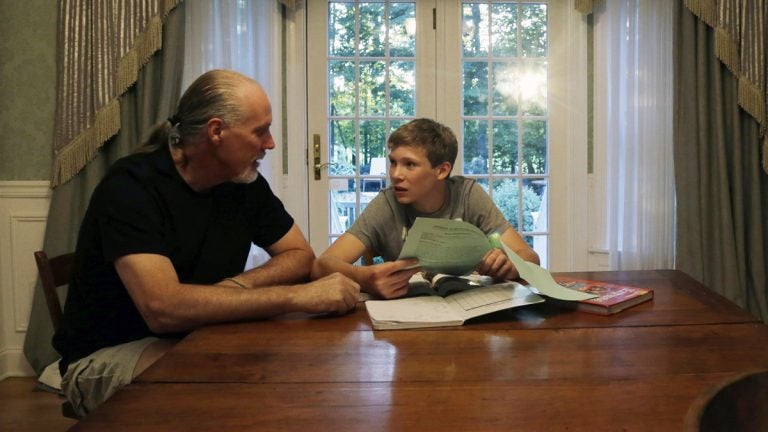Standardized tests: High stakes for adults, not children

Will Richardson (left) and his son Tucker at their home in Flemington, N.J. Tucker's parents, Wendy and Will, are part of a small but growing number of parents nationwide who are ensuring their children do not participate in standardized testing. (AP Photo/Mel Evans)
This is part of a series from education blogger Laura Waters of NJ Left Behind.
America is experiencing a new kind of civil disobedience. No, it’s not a Rosa Parks refusal to give up a front seat on a racially-segregated bus nor a Thoreauvian dissent with American imperialism. Instead, it’s the “opt-out movement” against standardized state tests.
In N.J., this movement is tied directly to N.J.’s implementation of new teacher tenure legislation. For the first time, teachers and administrators’ evaluations will be based not only on traditional classroom observations but also on results of standardized assessments. Starting this year, test results are “high stakes” for adults, not just for kids.
We’ve always had tests – instruction and assessment are inextricably linked – and N.J. has had state standardized tests since 1978. In fact, the initiation of state testing was part of the 1975 Public School Education Act, which was designed in order “to provide to all children of New Jersey, regardless of socioeconomic status or geographic location, the educational opportunity which will prepare them to function politically, economically and socially in a democratic society.” We took midterms and finals, pop quizzes and essay tests, SAT’s and ACT’s. So do our kids.
So what’s different?
The answer involves politics, not personal choice.
Now, there have always been parents who keep their children home on testing day; the N.J. Department of Education puts the number at about 2 percent. Some kids get sick. Some have testing phobias. And some parents regard state standardized tests as unfair and degrading to children with disabilities (and, indeed, they have a point). One parent with a special needs child told The Record recently that “it was such a demoralizing experience for her to realize just how far behind she is. For a child who is not at grade level, I don’t need the state of New Jersey to administer a test that makes her feel miserable about herself.”
That’s a personal choice based on the child’s best interest, an exercise of parental prerogative.The new element – which moves us from the realm of the personal to the realm of the political – is the nascent “opt out” movement, supported by groups like United Opt Out National: the Movement to End Corporate Education Reform.” This organization offers instructions on how to boycott state standardized tests, including New Jersey’s. One board member of Opt-Out National predicted, “You can feel the momentum. I think we’re headed for a full-on revolt next year.”
This “revolt” against testing is intended to protest what some regard as an unfair and unethical burden on classroom educators through the tyranny of data. Some go further and embrace a more militant view: the end game of education reform, including new standardized tests, is the decimation of public schools through a charade of failure and, eventually, the “privatization” of public education in order to enrich greedy hedge fund managers and for-profit charter school schemers. Sending your kids to school on testing days, then, is tacit approval of the triumph of heartless capitalism. (I’m not making this up. Read Diane Ravitch.)
Even NJEA, NJ’s primary teachers’ union and collaborator on N.J.’s new teacher evaluation law, has jumped on the opt-out bandwagon. On the NJEA website, parents are urged to “fight against the growing ‘testification’ of public education” which “has made schools worse.”
“As educators, we can speak out against the testing craze, but as long as our livelihood relies at least partly on students’ test scores, we have little choice but to play the game as the rules are currently written. Parents don’t have those limitations. And some of them are starting to act of their convictions. It’s a hopeful sign that they are willing to stand up to the harmful ideas that are hurting our schools.”
One can reasonably argue that New Jersey has been overly ambitious in its pace of change in testing and curriculum. One can reasonably argue that educators are legitimately threatened by a magnified emphasis on test scores in spite of uncontrollable variables that affect student academic success. One can reasonably argue that local districts’ identities are diminished by state mandates and testing schedules.It’s harder to argue that the “opt out” movement is driven by what’s best for kids. It’s driven by what’s best for adults.
_______________________________________________________
Laura Waters is president of the Lawrence Township School Board in Mercer County. She also writes about New Jersey’s public education on her blog NJ Left Behind. Follow her on Twitter @NJLeftbehind.
WHYY is your source for fact-based, in-depth journalism and information. As a nonprofit organization, we rely on financial support from readers like you. Please give today.




